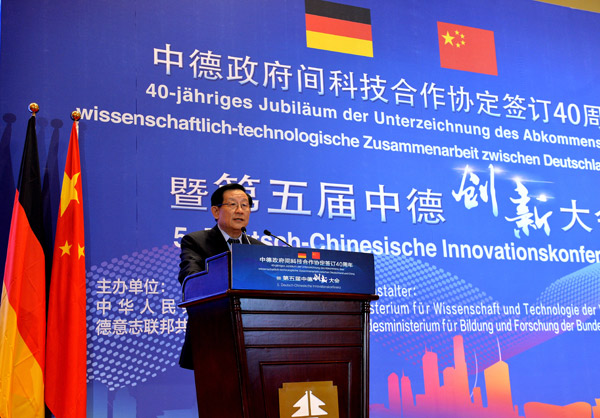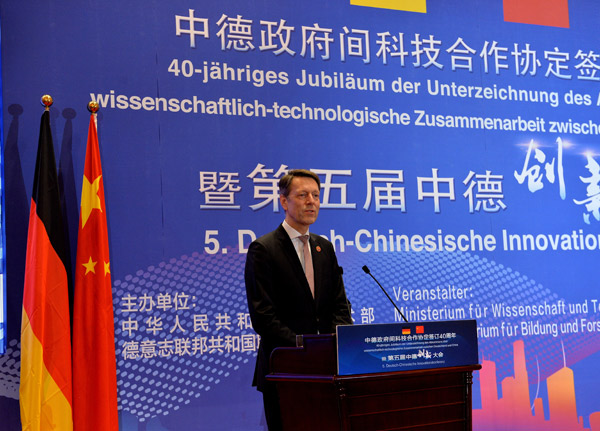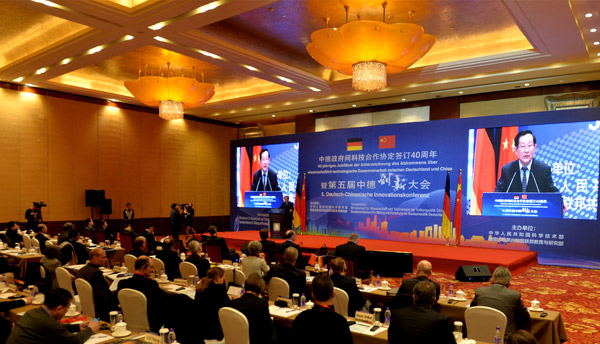2018 marks the 40th anniversary of the signing of the China-Germany Intergovernmental Agreement on Scientific and Technological Cooperation. From February 27 to 28, the Ministry of Science and Technology of China (MOST) and the Federal Ministry of Education and Research of Germany (BMBF) held the Fifth China-Germany Innovation Conference in Beijing. Premier Li Keqiang sent a congratulatory letter to the conference, which was read by Minister of Science and Technology Wan Gang at the gathering. Minister Wan Gang and State Secretary of BMBF Georg Schütte respectively delivered a keynote speech. More than 300 representatives from government departments and research and business circles attended the conference.

Minister Wan Gang remarked that the China-Germany Intergovernmental Agreement on Science and Technology Cooperation was one of the first intergovernmental cooperation agreements signed after the two countries established diplomatic relations. Cooperation in science and technology innovation was the pioneering field of establishing and expanding the relations between China and Germany. Over the past 40 years, the two sides have formed a relatively complete framework of intergovernmental cooperation in science and innovation, with close contacts and exchange visits between Chinese and German scientists and technicians, wide-ranging platforms and flexible mechanisms for research collaboration, increasingly closer ties with industry and growing enthusiasm for regional cooperation. In a new era of socialism with Chinese characteristics, the country is unswervingly taking the path of innovation-driven development and firmly relying on science and innovation, so as to constantly promote socio-economic development and improve the environment and people's livelihood. China will continue to adhere to the principle of openness and cooperation in science and innovation. As for future China-Germany cooperation in science and innovation, Minister Wan Gang made four suggestions: 1. consolidate exchange mechanisms for science and technology personnel; 2. expand cooperation to promote the development of innovation-driven economy in both countries; 3. consolidate the foundation for development of science and innovation bases; and 4. set examples to lead green and sustainable development worldwide.

State Secretary Georg Schütte highly praised China for its achievements in the fields of science and economy in the past decades. He pointed out that small- and medium-sized enterprises play a very important role in economic development and that there are numerous "invisible champions" in Germany and the two sides can expand cooperation in the field of innovation and entrepreneurship. The German government attaches great importance to cooperation with China in science and innovation, and hopes to step up future cooperation in the fields of climate change, environmental protection, population aging, life sciences, IoT, light-weight manufacturing and future cities.

At the conference, representatives from government, research and industrial circles of both countries looked back at 40 years of China-Germany cooperation in science and innovation, respectively discussed various topics including national innovation strategies and economic transformation, innovation and bilateral cooperation, AI and future cooperation, dialogue on innovation policy, intelligence and innovation of future cities, and intelligent manufacturing and smart services in China and Germany, tapping into prospects and opportunities for future cooperation.
On October 9, 1978, the Agreement between the Government of the People's Republic of China and the Government of the Federal Republic of Germany on Science and Technology Cooperation was officially signed. Since then, China-Germany cooperation in science and innovation has gone through the stages of take-off, development, expansion and leapfrogging progress, becoming the most important part of the all-round strategic partnership between China and Germany.

